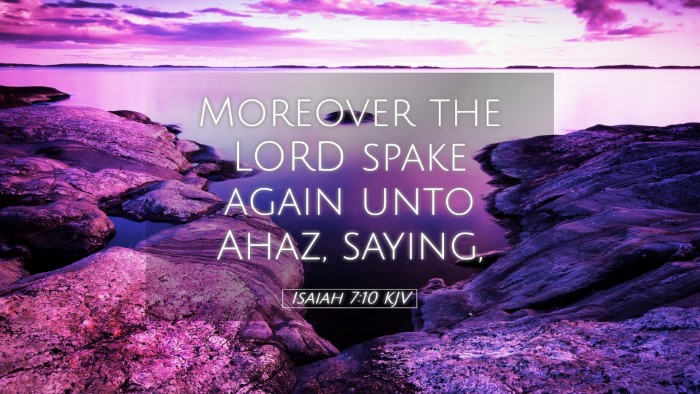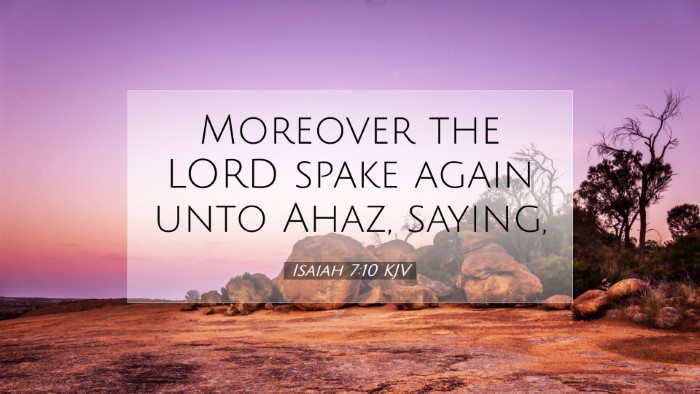Commentary on Isaiah 7:10
Verse Background
Isaiah 7:10 is set in a historical context where the kingdom of Judah, under the reign of King Ahaz, faced a coalition of threats from Israel and Syria. The prophet Isaiah is sent by the Lord to deliver a message of reassurance to King Ahaz, who is fearful of the surrounding nations. This verse emphasizes God's sovereignty and the importance of faith in his promises.
Insights from Matthew Henry
Encouragement to Seek Divine Guidance
Matthew Henry notes that the Lord’s command to Ahaz is significant as it illustrates the importance of seeking confirmation from God. He emphasizes that God, through His prophets, often provides the necessary counsel to guide His people, especially in times of crisis. Henry elucidates that Ahaz’s hesitation to ask for a sign demonstrates a lack of faith and an inclination towards self-reliance rather than divine dependence.
Insights from Albert Barnes
God’s Assurance through Signs
Albert Barnes points out that the request for a sign was not an unusual demand, as it reflects a common practice of seeking divine assurance. He explains that God's willingness to offer a sign serves not just as a reassurance but as an invitation to build faith. Barnes remarks on the nature of the sign itself, which reflects God's omnipotence and the miraculous nature of His promises. He highlights the theological implications of the verse, urging believers to recognize that divine intervention often comes at the critical juncture of human doubt.
Insights from Adam Clarke
The Significance of Asking for a Sign
Adam Clarke comments on the significance of Ahaz’s reluctance to ask for a sign, interpreting it as a manifestation of pride and fear. Clarke reinforces the view that God desires His people to seek Him earnestly, and by not asking, Ahaz was effectively rejecting God’s promise of deliverance. Clarke elaborates on the implications of receiving signs from God, arguing that they are meant to bolster faith and provide certainty amidst turmoil. He also reflects on the nature of signs and wonders in the context of prophetic ministry, emphasizing that they function as affirmations of God’s faithfulness.
Theological Reflections
- Divine Sovereignty: Isaiah 7:10 is pivotal in understanding God's control over historical events. The threats against Ahaz symbolize larger spiritual struggles, relating to God's overarching plan of redemption.
- Faith vs. Fear: The interaction between Isaiah and Ahaz epitomizes the struggle of faith. The encouragement to ask for a sign is a divine initiative to help Ahaz transition from fear to faith, reminding readers that God desires our trust.
- The Role of Prophecy: This verse is a testament to the prophetic ministry, which serves not only to foretell but also to fortify believers in God’s truth. The prophecy delivered is an invitation to renewed faith and hope in God’s promises.
Application for Pastors and Theologians
For pastors and theologians, Isaiah 7:10 offers profound insights into the nature of faith and divine interaction. It serves as a powerful reminder that God is continually engaged in the lives of His people, inviting them to seek Him actively. The narrative encourages a pastoral posture that embraces both prophetic truth-telling and compassionate guidance in confronting fears and uncertainties.
Conclusion
In summary, Isaiah 7:10 encapsulates the heart of God’s communication with humanity—a divine invitation for faith amidst fear. Through the voices of Henry, Barnes, and Clarke, we are reminded of the importance of seeking wisdom and signs from God, as His assurances lead believers from doubt to faith, and ultimately to deeper relational trust in Him.


